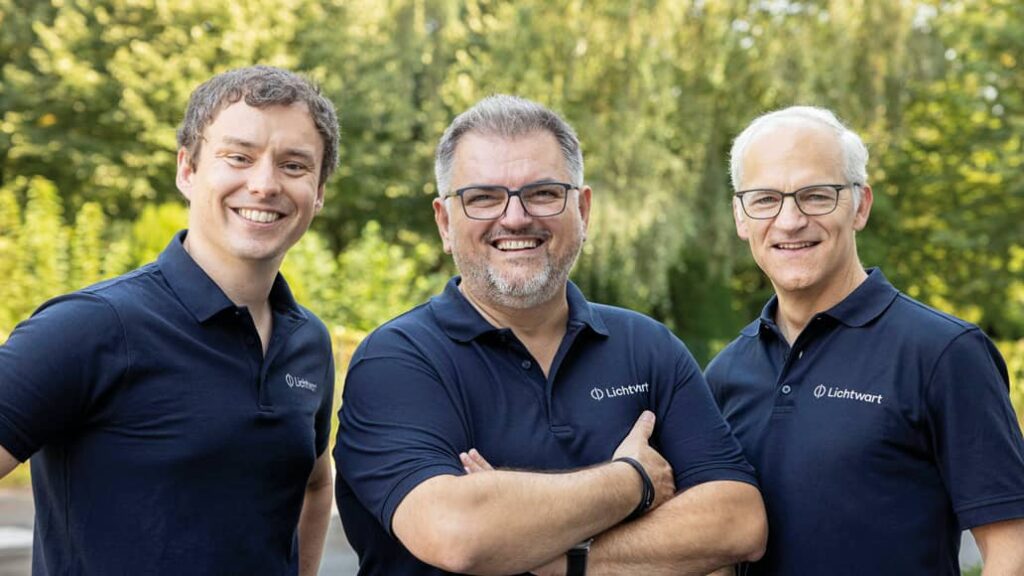Simply rethink light”: Lichtwart wants to avoid CO2 and light pollution with digital light management. The company has already attracted the interest of investors. Turning dumb outdoor lamps into smart luminaires – that’s what the founders of Lichtwart have set out to do. Johannes Mailänder, Gregor Giataganas and Jackson Bond come “from the field of light and the last mile”: together, they bring almost 150 years of experience in the fields of illuminated advertising and the “Internet of Things” (IoT) to the joint company.
“Let’s simply rethink light ourselves before the market disrupts us or we run into problems with Asian competition,” says Head of Communications and Marketing Johannes Mailänder, summarising the founding idea from 2020. One of the company’s goals is to become the new industry standard for intelligent commercial lighting systems that reduce both CO2 and light pollution.
Agnostic interface
The result is a cloud-based, manufacturer-independent, intelligent lighting control system for commercial/industrial outdoor lighting. Each module controls up to 64 power supply units and thus up to several hundred lamps. Deutsche Telekom contributed its IoT expertise to the development of the “Lichtwart” and, in just 18 months, developed an industrial application that can be used both in buildings and industrial plants as well as on “greenfield sites”, away from existing infrastructure such as network cables or Wi-Fi.
The three entrepreneurs’ idea aroused the interest of investors. While Johannes Mailänder and Gregor Giataganas initially financed the development of the module out of their own pockets, well-known business angels came on board at the turn of the year. In July 2024, the trio then raised a seven-figure sum from BitStone Capital, Vireo Ventures and better ventures in a pre-seed financing round for further development and series production. The founding trio is also using the acquired funds for internationalisation and environmental protection.
According to the Geo Research Centre in Potsdam and the University of Bochum, the brightness of the earth doubles every ten years, in Central Europe by 5 to 6 percent per year. According to the researchers, between 3 and 15 per cent of global energy consumption is attributable to light. Depending on the region, this corresponds to 1 to 5 per cent of global CO2 emissions.
To make light more energy-efficient and environmentally friendly, the founders built on existing communication technologies, hardware components and cloud platforms and also developed an interface with its own intelligence. This is agnostic, as Bond says – it works with systems from a wide range of manufacturers.
According to Lichtwart’s calculations, dynamic light reduction can save between 20 and 60 per cent of electricity with the same on-time. “The system reduces the outside light the darker it gets outside. Nevertheless, the lighting system is still sufficiently visible without the light being too bright,” explains Giataganas. This saves costs and increases the service life of the systems. “And there are simply fewer harmful light emissions, i.e. the dark side of light.”
Monitoring made easy
“The whole subject of outdoor lighting is so neglected, but it has a huge impact, and not just in monetary terms,” says Jackson Bond, who heads up sales at Lichtwart.
He has a whole bouquet of sales arguments at his disposal. For example, the module enables holistic monitoring of all locations from your pocket. “This has never been possible before, that you can control outdoor lighting systems via your mobile phone – from implementing the intelligence to operation and the Flight Light Assist service.”
The sales professional calls this way of rethinking light Light 4.0. Another unique selling point is the fact that any electrician can install the interface without lengthy training.
The interface also recognises impending malfunctions as part of predictive maintenance and thus prevents failures. As it is often difficult to find an electrician in a timely manner, the cloud platform also helps to locate the nearest specialist.
The entrepreneurs are not worried that companies such as Zumtobel or GE could penetrate their market. “We have a deep background in industry and illuminated advertising and are also very well networked, know the big players in Germany and Europe and have been working with some trade associations for up to 30 years,” Mailänder states matter-of-factly. What’s more, Lichtwart can do much more than just light: “We can also measure energy, monitor other units or switch systems.” A pleasant side effect for customers is the reading of ESG data.
According to the company, the market for Lichtwart is large. In Europe and the USA alone, we are talking about around 63 million properties with significant outdoor lighting, some of which are still “dumb” petrol stations, supermarkets, DIY stores, but also cities, industrial estates, business parks, “everything to do with B2B/B2G”.
The article was published first in MBI TradeNews Emissions.

